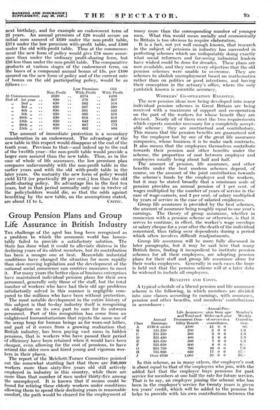Group Pension Plans and Group Life Assurance in British Industry
THE challenge of the aged has long been recognized as a problem to which the economic world has lamen- tably failed to provide a satisfactory solution. The State has done what it could to alleviate distress in the declining years of its oldest members, but its contribution has been a meagre one at best. Meanwhile industrial conditions have changed the situation far more rapidly than slow-moving legislation. and the development of the national social, _conscience can contrive measures to meet it. For many years the better class of business enterprises have maintained individual- pension plans for their own personnel, generally only those of the staff, but the total number of workers who have had their old age problems satisfactorily solved in this manner is negligible com- pared to the millions who have been without protection.
The most notable development in the entire history of this subject is that to-day industry itself is recognizing an obligation on its own -part to care for its outworn personnel. Part of this recognition has come from an enlightened humanitarianism that rejects the same use of the scrap heap for human beings as for worn-out lathes, and part of it comes from a growing realization that British industry, has been paying vast sums in hidden pensions, that, is workers who have passed their ,period of efficiency have been retained when it would have been cheaper, even allowing for the cost of pensions, to have retired the older men and hired young and vigorous wor- out the somewhat startling fact that there- are- 340,000 workers more than _sixty-five-years old still actively employed in industry in this country, while there are more than that-number of then under-thirty-five among the unemployed. It is known that if means could be found for retiring these elderly workers under conditions allowing.them to spend their declining years in reasonable comfort, the path would be cleared for the employment of kern in their places. . ! The report of the Melchett-Turner Committee pointed many more than the corresponding number of younger men. What this would mean socially and economically to Britain is too obvious to require elaboration. It is a fact, not yet well -enough knoWn, that -research in the subject of pensions in industry has succeeded in perfecting schemes which are indisputably doing exactly what social reformers and far-seeing industrial leaders have wished could be done for decades. These plans are now available, and they meet every objection that the old pension schemes were unable to overcome. They are schemes to abolish unemployment based on mathematics rather than on politics or good intentions, and having their conception in the actuary's office, where the only yardstick known is scientific accuracy.
















































 Previous page
Previous page